In Formula 1 timing – whether fortuitous or otherwise – is everything. This interview with Scuderia Ferrari managing director and team principal Mattia Binotto could hardly have been timed better.
Weeks ahead of the Monaco Grand Prix, we put it in the diary for Friday morning in Monaco. As it turned out, the two red cars topped the times sheets after Thursday’s preliminary runs through the principality.Binotto, now in his third season in charge of the team is, as always, utterly courteous and ‘correct’ when we connect on Zoom. But I detect a more upbeat tone to his comments than had perhaps been present during our last interview almost a year ago – which is wholly understandable given the pressures the then-50-year-old been under at the time.
When I start our latest interview saying the Scuderia having needed to “rebuild” after last season’s sub-standard results, he takes issue with my word choice, stressing that it had not been necessary to “rebuild” with a full, root-and-branch effort.
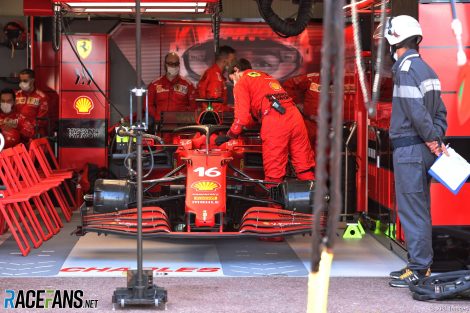
Given that Ferrari chairman John Elkann, Agnelli scion and boss of Exor – which controls the family’s various holdings including its interests in Ferrari and Stellantis, last-named being the newly formed Fiat-Chrysler and Peugeot-Citroen conglomerate – has his hands (over) full, does Ferrari not suffer convoluted decision-making processes, I ask?
“With Camilleri, we started the [current] journey; I think we invested a lot in our medium-to-long term future,” he explains. “The [signing of the] Concorde Agreement is one example, so I think a lot of work has been done to set the foundations.
Advert | Become a RaceFans supporter and
“John was already part of the time involved as chairman. I think today, it’s not a matter of rebuilding, it’s continuity from the past as Scuderia Ferrari and Gestione Sportiva (the sporting division), and obviously myself as managing director.
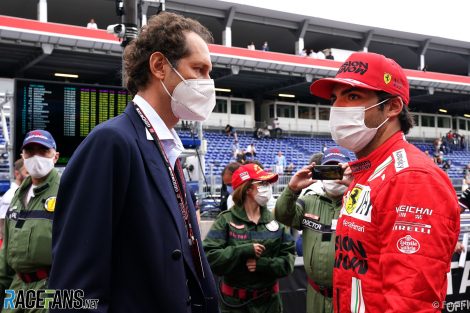
Will this structure and autonomy, though, remain in place after Elkann appoints Camilleri’s replacement?
“John Elkann is fully aware, fully involved and coming to some races; it’s a very positive and constructive collaboration that we’ve got. He is chairman and CEO, so no I report to him whatever we are doing and the main [decisions]. I’m convinced that because Ferrari is a unique family there will always be good, positive collaboration.”
Does Binotto foresee any impact on Ferrari from the Stellantis merger, which created the world’s eighth-largest motor manufacturer comprising brands ranging from Abarth and Alfa Romeo through Maserati, Opel and Peugeot to Vauxhall and employs 350,000 heads?
“No, Ferrari is independent from Stellantis, and I do not see any impact. Mr Elkann is very fully committed to the Ferrari project. He has announced that we will have very soon another (Ferrari) CEO.”
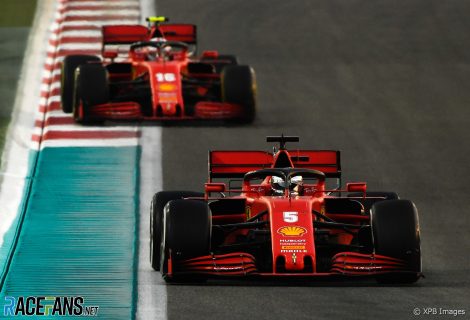
“It was a very difficult season,” he says somewhat wryly, “a lot of pressure on my shoulders. I certainly felt the responsibility. But I know that in such a difficult time the team was united. It would have been very easy internally for the team to blame each cause, but it never happened. The team remain united, with the right winning spirit to move forward and demonstrate that we can do better.
“As a leader the most important thing is that the team is united, which means that you’ve got the right [next tier] leadership. For me it was important at the time to ensure that the pressures that I had were not reflected into the team.
Advert | Become a RaceFans supporter and
“My focus was on that and not listening to rumours and putting blame on myself and on the team, keeping focusing on trying to improve.”
Did he ever doubt that he had the full support and confidence of Elkann and Camilleri?
“Never doubt about either,” is the earnest reply, “because I know that I had that since the very start. As I said, I’m fully empowered and my responsibility, and, as I said, last year we invested a lot in our medium-to- long-term future and I think we made the right choices.

“It took time at Red Bull or Mercedes; even more, if you look to Red Bull, it’s a long time that they are not winning [championships]. But they are the passions without let me say no revolutions inside of the team. They are passionate, working hard and working well, but to build it takes time. I know I have the full trust, and I feel the responsibility and it’s my job to commit to the world.”
That said, has he ever regretted accepted what is arguably the highest profile role in F1, one that carries a weight of expectation and has proven a poisoned chalice to many team bosses over the years?
“I have never regretted it,” he says immediately, sitting up for emphasis, “because I enjoy the passion which is Formula 1, I enjoy the passion for the Cavallino. I’ve always been a fan. I know it’s a big challenge but overall I’m very keen to be part of the family and give my full support to whatever is the result of the future project.”
“For me it’s more important to be part of the family rather than being team principal,” he continues. “Each person has got his own responsibility within the team and here is not one role which is more important. That’s my role today, I’ve been chosen to do it, I try to do my best.”
While car performance has improved – as evidenced by Thursday’s results – the team was also previously prone to operational errors, such as strategy slip-ups and reliability problems. Leclerc’s failure to start from pole position at home in Monaco, which occured after our interview, provided a further example. Surely these need to be eradicated if the team is to return to front-running form. How will these be overcome?
“That’s a good point, because as I said before, it’s a matter of time and passion. There are no silver bullets, so it’s a matter of approaching the mistakes as a lesson-learned approach, ensuring that each time a mistake is made it’s not a matter of blaming someone.
“It’s a matter of understanding what were the reasons, why we came to that choice and that mistake, and ensuring that we put in place actions to avoid them in the future. Stability in the team is crucial as well, we’ve got the same persons doing strategies since many years, the pit crew is stable.
“So, keeping stability and building a team that can improve time after time [is the objective], mistakes after mistakes is where we are putting our effort. If we look at the season we’ve had so far: solid race weekends; there have been difficult situations like in Imola, the weather, the rain, but I think we always made the right strategic choice and on the engineering side, the pit crew side it has been quite consistent. That’s important.”
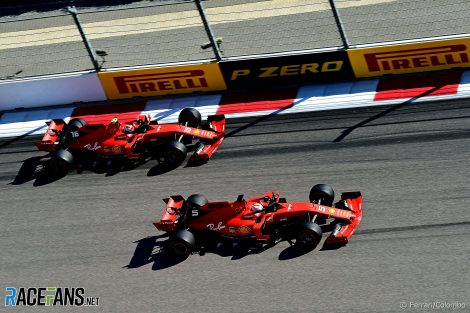
“No, no, no – what happened in 2019 was not the reason,” Binotto states emphatically. “When we had the lockdown at the start of last year it was the time for us to decide [on our future driver line-up]. It was even more important to decide very soon simply out of full respect to ourselves, and to Sebastian to give him the opportunity to find another seat.
“The fact that today he’s driving for Aston Martin, I’m very happy with that.”
Under this year’s sporting regulations teams benefit from additional wind tunnel hours on a sliding scale based on championship positions at start and mid-point of the season. Thus, Ferrari benefits from its 2020 sixth place, and whatever its interim classification after the first Austrian round. How much of a help has that been in developing next year’s car?
“I don’t think it is much [but] certainly it’s better to add some extra hours than not. But, if you look at the overall benefit it’s a couple of sessions on the wind tunnel. Normally a couple of session can give up to maybe a 10th second per lap, which can be significant when you are battling. It’s not a game changer.”
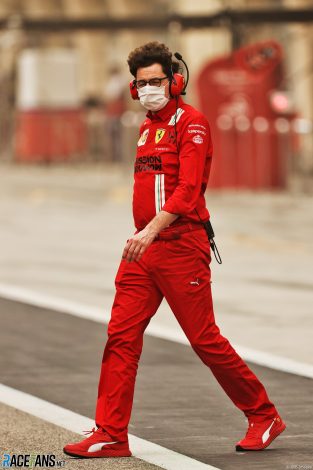
“I was in favour because [F1] was looking for tricks to help convergence, like balance of performance, where you add [weight] ballast during race weekends,” he explains. “I think this is a better, let me say, ‘trick’.”
Talking ‘tricks’, does he believe that the budget cap will limit innovation by limiting spend available?
“As far as ‘is the budget cap limiting innovation?’ I’m not too sure. In F1 that are always regulations and what we are doing is pushing ourselves to the limit of the regulations in innovating within the framework of the regulations. We have technical, sporting regulation and now there are financial regulations, fair enough.
“The spirit is to somehow try to innovate to the maximum. So there will still be innovations that matter but now we need to be more efficient and chase each single [inefficiency]. What we are doing as Ferrari and the other top teams at the moment is before we cut any opportunities for development is to ensure that we are efficient and chasing wastage.
“In that respect there is much that can be done, which means that the financial regulations will help F1 teams become more efficient in the future, which is good and which is also innovation. It’s not technical innovation, but it’s still innovation. Lean engineering is something which is becoming more and more important.” As an example he lists simulation tools, saying they provide, “the cheapest way of developing.”
“There is so much which is so complex [in the wider automotive field] that you need good simulations, otherwise expenditure will be too significant,” he explains. “So F1 can become a platform for innovation in this respect.”
The current buzzwords is F1 and supercar circles are ‘biofuels’ and ‘synthetic fuels’, which both factions believe could make their respective products sustainable. Indeed, Porsche is actively pushing the development of such energy sources. Where does Ferrari stand in this regard?
“I don’t know if biofuel is the right definition, I would say renewable fuels,” comments the former head of Ferrari’s F1 engine department. That’s the way we should approach it, the technical specifications of it. I see that full electric is not the only solution for the future of the automotive. I think that hybrid engines are certainly an alternative.
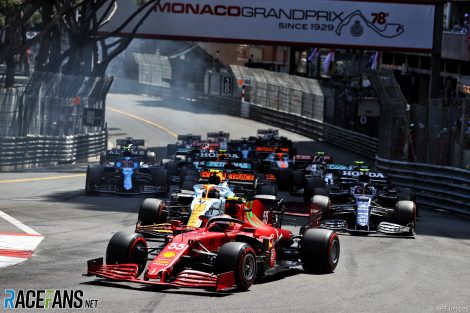
“I think the alternative to full electric is engines designed for the purpose of being hybrid, powered by renewable fuels. F1 has to remain an important innovation platform for the automotive [industry], and I think that deciding the new regulations is key in that respect.”
Spearheading Ferrari’s F1 programme is probably the sport’s biggest challenge. As Binotto pointed out, it took Todt well-nigh seven years to return the Scuderia to championship-winning ways – and look what happened once the turnaround was complete: the team set records that have taken over two decades and half-billion annual budgets to beat.
In many ways Binotto calm approach to the job reminds of the Frenchman’s approach, and that is surely his biggest asset as he leads Ferrari’s regroup. But Binotto is also his own man, one with a more technical approach to the role than Todt had. As F1 faces its ‘new era’ that approach could well prove decisive.
RacingLines
- The year of sprints, ‘the show’ – and rising stock: A political review of the 2021 F1 season
- The problems of perception the FIA must address after the Abu Dhabi row
- Why the budget cap could be F1’s next battleground between Mercedes and Red Bull
- Todt defied expectations as president – now he plans to “disappear” from FIA
- Sir Frank Williams: A personal appreciation of a true racer





Mayrton
2nd June 2021, 12:13
Well, we’ve heard that story for the last decade. Still, the lessons seem to be absent. For a team with this history, it is unacceptable where they are and have been the last years. Wouldnt want to own/buy one of their products, so perhaps from marketing perspective they’d be better off quitting F1. It has not been an advertising effort for years now
Esploratore (@esploratore)
2nd June 2021, 12:19
Well, ferrari, mclaren and williams are all historical teams, and from what I saw, ferrari’s lows haven’t been as low as mclaren’s lows, which haven’t been as low as williams’ lows, and the “williams has no money” excuse is not valid, they USED to have money when winning.
Mayrton
2nd June 2021, 12:27
True that. Although technically I don’t regard Williams as a top team, it is quite historical though. They had an advantage with the active suspension that kind of boosted their image but to me they have always been a rather poorly managed team which I still hold responsible for Ayrton’s death. Ofcourse nobody intended to do this, but poor processes lead to poor situations.. that steering column of theirs..
Asanator (@asanator)
2nd June 2021, 13:06
It doesn’t sound like it is Ferrari who is wedded to the past….lol
And it wasn’t a steering column failure that killed Senna.
Esploratore (@esploratore)
3rd June 2021, 8:21
Wasn’t it well known that a steering column failed which caused the crash that produced 3 fatal injuries when a piece pierced the helmed? I thought that was linked to the steering column failure.
erikje
2nd June 2021, 12:20
Really? That’s the storyline for one of the most disrespectful driver switches in recent years.
Mayrton
2nd June 2021, 12:37
And with that one of Ferrari’s biggest problems. They are not sincere and not authentic. They are old school old economy PR twisters. While in this day and age, it is totally unnecessary. Its actually an advantage if you show your cards and struggles and be honest. The DNA of this company is its biggest enemy. And culture eats strategy for breakfast. So you can switch many Binnoto’s as often as you like, wont make a difference.
Asanator (@asanator)
2nd June 2021, 13:07
Have you seen how Redbull treats its drivers?
GS (@gsagostinho)
2nd June 2021, 13:22
I suggest you check this out:
GS (@gsagostinho)
2nd June 2021, 13:22
@asanator missing link: https://en.wikipedia.org/wiki/Whataboutism
Balue (@balue)
3rd June 2021, 17:06
Whataboutism: Word used to stamp out any comparative argument
Dave
2nd June 2021, 14:40
It’s no secret!
Mashiat (@mashiat)
2nd June 2021, 13:58
How was the driver switch so disrespectful? Can you blame Ferrari for wanting to be rid of Vettel? Because I can’t. He was one of the highest-paid drivers in the whole field, and Ferrari was not getting the performance worthy of his salary and past success. You have someone in Leclerc who is 10 years younger and already better, so why keep Vettel? Ferrari also tried to make it seem like it was more of a mutual decision, which paints Vettel is a better light, rather than the truth which is that Vettel wasn’t good enough anymore. Would you have preferred it if they let Vettel go halfway through the 2020 season, at which point no seats would have been available for him?
erikje
2nd June 2021, 16:41
Even if Vettel did not deserve his drive, you can respect the driver.
The way he was put aside was shocking disrespectful.
In fact you seem to be the only one who questiones this behavior and see it as normal.
Well maybe for Ferrari that is..
Esploratore (@esploratore)
3rd June 2021, 8:24
I agree, he wasn’t worthy of a seat any more and I’m not sorry for how ferrari treated him, I’d have probably let him go earlier, he’s been underperforming for a while (not hamilton level when there was the chance to clinch a title).
Dave
2nd June 2021, 14:41
Do you think that Ferrari’s 2020 season was the worst season ever of all time in world motorsport history?
Patrick (@paeschli)
3rd June 2021, 8:36
The manner was disrespectful (from what Seb said) but the timing was quite generous
Computer gods have logged me out again.
2nd June 2021, 15:39
I automatically read that in Binotto’s voice.
Well they have been close winning championships for over a decade now. It’s not their worst “record” but it would do a lot for F1 and motorsport if they would be able to win in couple of years. It’s not the same if let’s say Barcelona can’t win La Liga in 13 years but if Ferrari is still winless after 2029 I can’t help thinking their value would decrease massively.
Balue (@balue)
2nd June 2021, 15:44
From blame-culture to too much the other way. I guess that’s how the pendulum swings, but keeping the strategy team intact is a huge mistake when it’s proven to be woeful for many years now. There’s a time for everything, and the time is to axe Rueda & co.
Michael (@freelittlebirds)
2nd June 2021, 17:44
Breaking news – Maurizio Arrivabene is going to be the CEO of Juventus FC!
CashNotClass (@cashnotclass)
2nd June 2021, 20:07
It’s important to point out that Ferrari has been the most successful team bar Mercedes in this V6 era. They get criticized a lot, but they’ve done much better than other big name teams and even mounted two somewhat serious championship challenges. Not exactly down to the wire nail biters, but they got pretty close to Mercedes. None of the other teams has done so, though Red Bull is doing a good job this season at trying to replicate that. Still their first, though.
That said, pretty much all of that success was had before Binotto took over the Scuderia. From a championship contender in 2018 under Arrivabene, Ferrari under Binotto mounted a highly dubious 2019 campaign (and still a very unsuccessful one despite all the shenanigans), a disastrous 2020 season, and so far yet another uninspiring season near the head of the midfield. Is it any surprise he doesn’t want to ‘blame people’?
Esploratore (@esploratore)
3rd June 2021, 8:26
True about binotto, and imo ferrari was lacking something in 2017 both in speed and reliability, but 2018 was good enough to challenge and the only reason it lost the title early were vettel’s many mistakes.
CashNotClass (@cashnotclass)
6th June 2021, 13:21
@esploratore Ferrari made big mistakes in their car development in 2018, so much so that around the USA race they went back to a months old spec and were immediately faster. Vettel’s incidents didn’t help, but the team made more serious missteps that contributed to his overdriving.
@justrhysism For sure it wasn’t all great before Binotto, but the results were still much better. Ferrari’s competitiveness next year will be the true test of Binotto’s influence and ability to lead the team.
Rhys Lloyd (@justrhysism)
6th June 2021, 0:27
@cashnotclass I think when Binotto took the helm the ship was heading way off course from the Arrivabene years.
Likewise Arrivabene took the helm of the ship only slightly off-course—and seemed to brutally over-correct and sent it in completely the wrong direction.
It’s slow to drift off course, and slow to bring it back.
Even if you manage to put the perfect team in place immediately, it takes years for everything to truly come together. Likewise it’s a slow wind down when things are going wrong.
Dave
14th June 2021, 9:27
Ferrari still can’t get Gold…